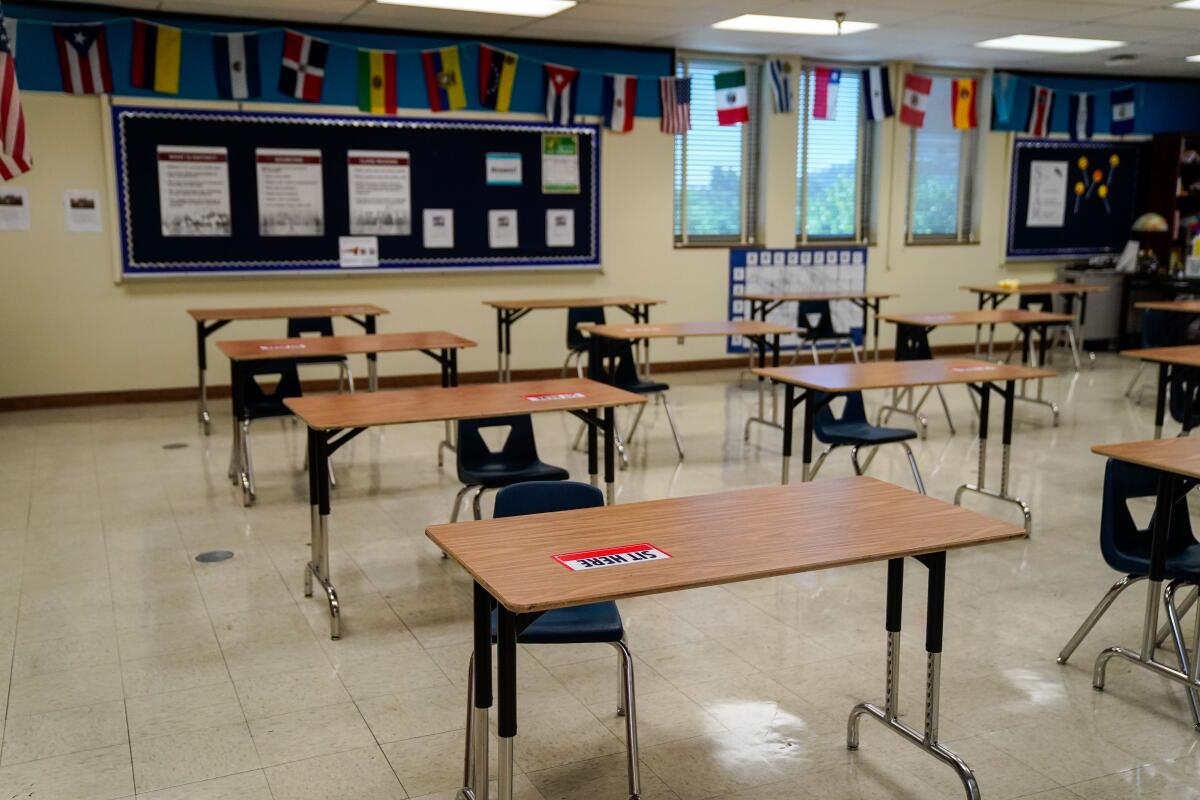Fresno schools make a controversial decision about police on campuses

- Share via
Good morning, and welcome to the Essential California newsletter. It’s June 22. I’m Justin Ray.
Policing has certainly been in the spotlight over the past year. Both pro- and anti-police voices have laid out their vision of what role officers should have going forward.
Against this background, police presence at schools has come under scrutiny. Activists who argue that putting cops in schools doesn’t generate the best outcomes are growing louder and making big changes in education. Seattle, Minneapolis and Portland have decided to suspend police presence on campuses.
In California, the Oakland Unified School District school board unanimously voted to eliminate its school police department in June 2020. In February, the Los Angeles Unified School District approved a plan to cut a third of its officers, ban the use of pepper spray and divert funds from the department to improve the education of Black students.
Sign up for Essential California
The most important California stories and recommendations in your inbox every morning.
You may occasionally receive promotional content from the Los Angeles Times.
Last week, the Fresno Unified school board took a different path: Board members decided to keep armed police officers in schools despite objections from community groups, the Fresno Bee reported. The board voted 6 to 0 to reapprove its contracts with the Fresno Police Department, with one trustee who pushed to change the district’s partnership with police abstaining.
The new contract includes opportunities for students, staff, teachers and parents to give input on how officers work on campuses, the Bee reported. The district also earmarked more than $42 million for mental health-related services for this school year.
But police are not returning to the middle schools, mostly due to a lack of officers, Fresno Unified Supt. Bob Nelson told the Los Angeles Times.
Nelson said that he feels good about the contract decision, and that police should be part of conversations about educational environments. “I don’t think you fix the problem by excluding systemically a group of people who may be causing the problem and then not having them at the table for purposes of discussion. You have to slog through your own inaccuracy together in order to get to a better place,” he said.
“I feel the vote sent a strong message that the safety and security of students and staff is important to the school board,” Fresno police Chief Paco Balderrama told The Times.
But nationally, activists have urged districts to end their relationships with police, citing data showing that mass shootings on campuses are rare and that crime at schools is falling. Additionally, studies have also shown students of color are more likely to face harsher consequences for misconduct.
To understand policing on campus, one needs to understand how we got here. While police officers have been tasked with responding to calls from schools for a while, it wasn’t until the 1990s that officers began to frequent school hallways, the New York Times reported. That’s when federal and state officials began to offer school districts money to hire cops and for such equipment as metal detectors in response to concerns over mass shootings, drug abuse and juvenile crime.
By the 2013-14 school year, two-thirds of high school students and 45% of middle schoolers attended schools with a police officer, a 2018 report from the Urban Institute found. Additionally, schools with majority Black and Latino students were more likely to have officers than those with majority white student bodies.
Balderrama says cops on campuses can help change the conversation around policing.
“We need to create more opportunities to engage with youth in a positive manner to change that narrative. When young people of color see a police officer, I want them to see someone who is there to help them ... not to hurt them,” he said.
How much support do officers have in the Fresno community? According to a survey and focus groups conducted by Fresno Unified School District and Fresno State, most students and parents want to keep police on campuses, the Bee reported.
But Marisa Moraza, the youth advocacy leadership manager for Fresno Barrios Unidos, says the nonprofit “fully rejects” the finding of the survey and focus groups, claiming they reflect only perceptions and not real, lived experiences shown in data. “We cannot make policy based on perception. We have to make policy based on data.”
What do the numbers say? 2019 data from the Fresno Police Department show that for the 16 campuses and 11,311 students, of the reported crimes, six were felonies, 159 were misdemeanors and 23 were infractions. Data also show that Black students were disproportionately arrested. During that year, Black students made up 7% of the student population, but accounted for about 25% of all school arrests. When asked about the arrest numbers of Black students, Balderrama responded:
“The Fresno Police Department is working closely with the Fresno Unified School District to enhance our data gathering tools to assess our performance. Although in most instances school administrators call on police officers to intervene in some matters, we need to make sure all students are being treated fairly and not being singled out because of their race.”
Nelson says, however, officers aren’t the only ones to blame for issues in policing at schools.
“The reality of it is, we tend to portray police as the universal problem. But if school administrators are pretty honest about it, the vast majority of contacts that happen between kids and police officers are dictated by the school administrators who are saying, ‘Hey, go handle this’,” Nelson said.
Fresno Barrios Unidos is pushing for reforms such as creating policies that clearly state when police are to be on campus, such as in emergencies. Moraza says students have told her officers are often used as threats to address minor behavioral issues (as in, “If you don’t behave, I’m going to call the police”). The organization is pushing for schools to develop mental health wellness centers and peer support programs, rather than having students interact with the police and reinforcing the school-to-prison pipeline.
“I feel comfortable with the decision. But it’s not over, right? This is just act nine of a 15-act play. At the end of the time, we’ll figure it out and we’ll keep going,” Nelson said.
There’s a lot more to know about the vote, which you can read at the Fresno Bee.
And now, here’s what’s happening across California:
Note: Some of the sites we link to may limit the number of stories you can access without subscribing.
L.A. STORIES
Can George Clooney and a new L.A. high school make Hollywood crews more inclusive? George Clooney and a group of A-listers, including Don Cheadle and Kerry Washington, are working with the Los Angeles Unified School District to launch an academy. The institution promises to provide education and practical training in the arts and sciences of filmmaking to marginalized communities.
“Right now is a perfect time to get people to participate, because right now their eye is on the ball,” Clooney said in an interview Sunday. Los Angeles Times

'The Times' podcast
Our new weekday podcast, hosted by columnist Gustavo Arellano, takes listeners beyond the headlines. Subscribe on Apple Podcasts and follow on Spotify.
POLITICS AND GOVERNMENT
Hotline for fraud. Sonoma County employees and members of the public can now anonymously report suspected fraud, waste or abuse within the county government. “Whistleblowers and protections for whistleblowers help keep government, businesses and other institutions on the right side of the law,” Lynda Hopkins, chair of the Sonoma County Board of Supervisors, said in a release. Petaluma360
Prison closing means bad news for town. In April, the state announced it would close the California Correctional Center, which provides nearly 1,100 jobs and among the highest wages in Susanville. Residents of the impoverished, shrinking town of 8,000 residents are upset: “It’s going to devastate the whole community.” Los Angeles Times
CRIME AND COURTS
This plan is nuts. A man was arrested and $100,000 in stolen pistachios have been recovered. Tulare County sheriff’s officials say Alberto Montemayor, 34, stole and intended to resell the nuts. Touchstone Pistachio Co. in Terra Bella contacted detectives on June 17 after the company discovered they were missing the pistachios. Montemayor’s attorney information wasn’t immediately available. KGET
Shooting leaves three dead. Gunfire at a house party in Richmond left three people dead, police said. The party was attended by 80 to 100 people, and victims were all men between the ages of 18 and 44. The Richmond City Council voted last week to eliminate 12 open positions from the Police Department, bringing the total number of officers down to its lowest number in 18 years. San Francisco Chronicle
Support our journalism
HEALTH AND THE ENVIRONMENT
COVID shrinks the mind? A new study suggests that COVID-19 might shrink parts of the brain. The findings were mentioned by former Food and Drug Administration Commissioner Dr. Scott Gottlieb on the Sunday news program “Face the Nation” on CBS as an example of why it is so important for people to get vaccinated. “Certain areas of their brain showed a decline in actual tissue — a shrinkage of parts of their brain,” Gottlieb said. Los Angeles Times
CALIFORNIA CULTURE
A hot take on a statue. “Palm Springs is a famously LGBTQ-friendly city, but on Sunday an anti-queer slur was lifted high onto a civic pedestal in one of America’s least likely places,” Pulitzer-winning Times art critic Christopher Knight writes of a new Marilyn Monroe statue. “A colossal monument to misogyny is awful anytime, but its grand, celebratory unveiling during LGBTQ Pride Month is especially repugnant.” Los Angeles Times
New rental car service for people with disabilities. There is a new Sacramento car rental service to help those in a wheelchair. The nonprofit Paratransit is making vehicles available that all come with ramps. The wheelchair-accessible rentals are for short-term and long-term use. CBS Sacramento
Free online games
Get our free daily crossword puzzle, sudoku, word search and arcade games in our new game center at latimes.com/games.
CALIFORNIA ALMANAC
Los Angeles: Cloudy, 80. San Diego: Overcast, 72. San Francisco: Cloudy, 71. San Jose: Sunny, 78. Fresno: Sunny, 97. Sacramento: Sunny, 87.
AND FINALLY
Today’s California memory comes from Michelle Mowery:
As a SoCal kid, summer was always my favorite season: brown legs and feet toughened by going barefoot all summer. Riding my purple Schwinn Stingray all over our Torrance neighborhood. A favorite evening pastime was sitting on the curb at dusk, sometimes with ice cream, and watching the light show put on in the sky as the Goodyear blimp cruised slowly to the south over the Palos Verdes Peninsula. One summer night in August, the light in the dark sky was quite different. Our gazes were drawn to the glow in the northeast as the sky burnt orange while the fires from the Watts Riots filled the night sky.
If you have a memory or story about the Golden State, share it with us. (Please keep your story to 100 words.)
Please let us know what we can do to make this newsletter more useful to you. Send comments to essentialcalifornia@latimes.com.
Sign up for Essential California
The most important California stories and recommendations in your inbox every morning.
You may occasionally receive promotional content from the Los Angeles Times.







